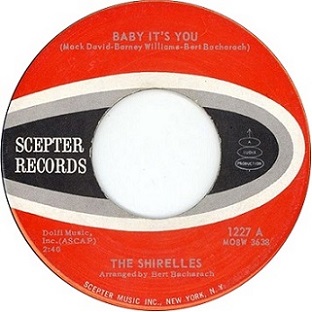
"Twist and Shout" is a 1961 song written by Phil Medley and Bert Berns. It was originally recorded by the Top Notes, but it did not become a hit in the record charts until it was reworked by the Isley Brothers in 1962. The song has been covered by several artists, including the Beatles, Salt-N-Pepa, The Astronauts and Chaka Demus & Pliers, who experienced chart success with their versions.

"Blue Bayou" is a song written by Roy Orbison and Joe Melson. It was originally sung and recorded by Orbison, who had an international hit with his version in 1963. It later became Linda Ronstadt's signature song, with which she scored a Top 5 hit with her cover in 1977. Many others have since recorded the song.

"Denise" is a song written by Neil Levenson that was inspired by his childhood friend, Denise Lefrak. In 1963, it became a popular top ten hit on the Billboard Hot 100 chart, when recorded by the American doo-wop group Randy & the Rainbows. A cover version by the American new wave group Blondie, re-titled "Denis", reached number 2 in the UK Singles Chart in 1978. Dutch actress and singer Georgina Verbaan covered "Denis" in 2002 and reached number 30 on the Dutch Singles Chart.

"December, 1963 " is a song originally performed by the Four Seasons, written by original Four Seasons keyboard player Bob Gaudio and his future wife Judy Parker, produced by Gaudio, and included on the group's album Who Loves You (1975).

"Little Saint Nick" is a song by American rock band the Beach Boys first released as a single on December 9, 1963. Written by Brian Wilson and Mike Love, the Christmas song applies hot-rod themes to Santa Claus and his sleigh.
The Irish Singles Chart is the Republic of Ireland's music industry standard singles popularity chart issued weekly by the Irish Recorded Music Association (IRMA) and compiled on their behalf by the Official Charts Company. Chart rankings are based on sales, which are compiled through over-the-counter retail data captured electronically each day from retailers' EPOS systems. All major record shops, digital retailers and streaming services contribute to the chart, accounting for over 95% of the market. A new chart is compiled and released to the public by the Irish Recorded Music Association on Friday at noon. Each chart is dated with the "week-ending" date of the previous Thursday. The singles chart was first published on 1 October 1962, and covered the top ten singles of the previous week by record label shipments.

"Baby It's You" is a song written by Burt Bacharach (music), Luther Dixon, and Mack David (lyrics). It was recorded by the Shirelles and the Beatles and was a hit for both. The highest-charting version of "Baby It's You" was by the band Smith, who took the track to No.5 on the US charts in 1969.

"It's My Party" is a song by American singer-songwriter Lesley Gore from her debut studio album I'll Cry If I Want To (1963). It was released as the lead single from the album on April 5, 1963, by Mercury Records. The song was collectively written by Herb Wiener, John Gluck Jr., and Wally Gold, while production was helmed by Quincy Jones.

"Do Wah Diddy Diddy" is a song written by Jeff Barry and Ellie Greenwich and originally recorded in 1963, as "Do-Wah-Diddy", by the American vocal group the Exciters. Cash Box described the Exciters' version as "a sparkling rocker that bubbles over with coin-catching enthusiasm" and said that the "great lead job is backed by a fabulous instrumental arrangement." It was made internationally famous by the British band Manfred Mann.

"Too Much, Too Little, Too Late" is a song performed by singers Johnny Mathis and Deniece Williams. Lyrics and music were arranged by Nat Kipner and John Vallins. The single was a comeback of sorts for Mathis as his last U.S. top 10 hit was 1963’s "What Will Mary Say" and his last U.S. #1 hit was 1957's "Chances Are."

"Can't Get Used to Losing You" is a song written by Jerome "Doc" Pomus and Mort Shuman, first made popular by Andy Williams in a 1963 record release, which was a number-two hit in both the US and the UK. Twenty years later, British band the Beat took a reggae re-arrangement to number three in the UK.

"Rhythm of the Rain" is a song performed by The Cascades, released in November 1962 in the US and on January 25, 1963 in the UK. It was written by Cascades band member John Claude Gummoe. On March 9, 1963, it rose to number 3 on the Billboard Hot 100, and spent two weeks at number 1 on Billboard's Easy Listening chart. Billboard ranked the record as the number 4 song of 1963.

"The Next Time" backed with "Bachelor Boy" was the first of three number one hit singles from the Cliff Richard musical, Summer Holiday. Both sides were marketed as songs with chart potential, and the release is viewed retroactively as a double A-side single. However, technically double A-sides were not regarded as such until 1965, so "The Next Time" was pressed as the A-side, with "Bachelor Boy" the B-side. The song was succeeded at number one by The Shadows' "Dance On!".
"I (Who Have Nothing)" (sometimes billed as "I Who Have Nothing") is an English language cover of the Italian song "Uno dei Tanti" (English: "One of Many"), with music by Carlo Donida and lyrics by Giulio "Mogol" Rapetti. The initial version, "Uno dei Tanti", was performed by Joe Sentieri in 1961. The song first recorded in English by Ben E. King in 1963 with new lyrics by Jerry Leiber and Mike Stoller.

"Summer Holiday" is a song recorded by Cliff Richard and the Shadows, written by rhythm guitarist Bruce Welch and drummer Brian Bennett. It is taken from the film of the same name, and was released as the second single from the film in February 1963. It went to number one in the UK Singles Chart for a total of two weeks. After that, the Shadows' instrumental "Foot Tapper"—also from the same film—took over the top spot for one week, before "Summer Holiday" returned to the top spot for one further week. The track is one of Richard's best known titles and it remains a staple of his live shows. It was one of six hits Richard performed at his spontaneous gig at the 1996 Wimbledon Championships when rain stopped the tennis.

"(You're the) Devil in Disguise" is a 1963 single by Elvis Presley. It was written by Bill Giant, Bernie Baum, and Florence Kaye and was published by Elvis Presley Music in June 1963. The song peaked at No. 3 in the US on the Billboard singles chart on August 10, 1963, and No. 9 on the Billboard Rhythm and Blues chart, becoming his final top ten single on either chart. The single was certified gold by the RIAA for sales in excess of 500,000 units in the US. The song also topped Japan's Utamatic record chart in the fall of 1963.

"Roses Are Red (My Love)" is a popular song composed by Al Byron and Paul Evans. It was recorded by Bobby Vinton, backed by Robert Mersey and his Orchestra, in New York City in February 1962, and released in April 1962, and the song was his first hit.

"I'm Leaving It Up to You" is a song written by and originally performed by Don Harris and Dewey Terry in 1957. It was later popularized in 1963 by the American duo Dale and Grace, who took it to #1 on the Billboard Hot 100 chart. In 1974, Donny and Marie Osmond reached the top five on the US Hot 100 chart and peaked at #1 on the Billboard Hot Adult Contemporary chart with their cover.

"It's the Most Wonderful Time of the Year" is a popular Christmas song written in 1963 by Edward Pola and George Wyle. It was recorded and released that year by pop singer Andy Williams for his first Christmas album, The Andy Williams Christmas Album. However, the song was not released as a promotional single by Williams' record label that year, as they instead opted to promote his cover of "White Christmas" as the official promo single from the album. "It's the Most Wonderful Time of the Year" has consistently made it onto pop singles charts around the world in the 2010s and 2020s. It peaked at No. 5 on the US Billboard Hot 100 singles chart in 2020 and at No. 9 on the UK Singles Chart in 2021.
















